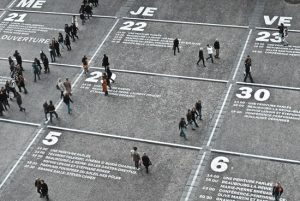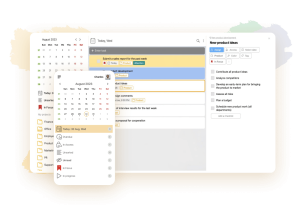Features of teamwork

Behind every success is a well-coordinated and competently organized team activity. Almost all the existing benefits of modern civilization are the result of collective work. In any activity a person has to interact with other people. Therefore, everyone needs to learn the skills of teamwork as early as possible. Let’s try to understand what this concept includes, and what skills you need to possess to become a good “team player”.
What teamwork is all about
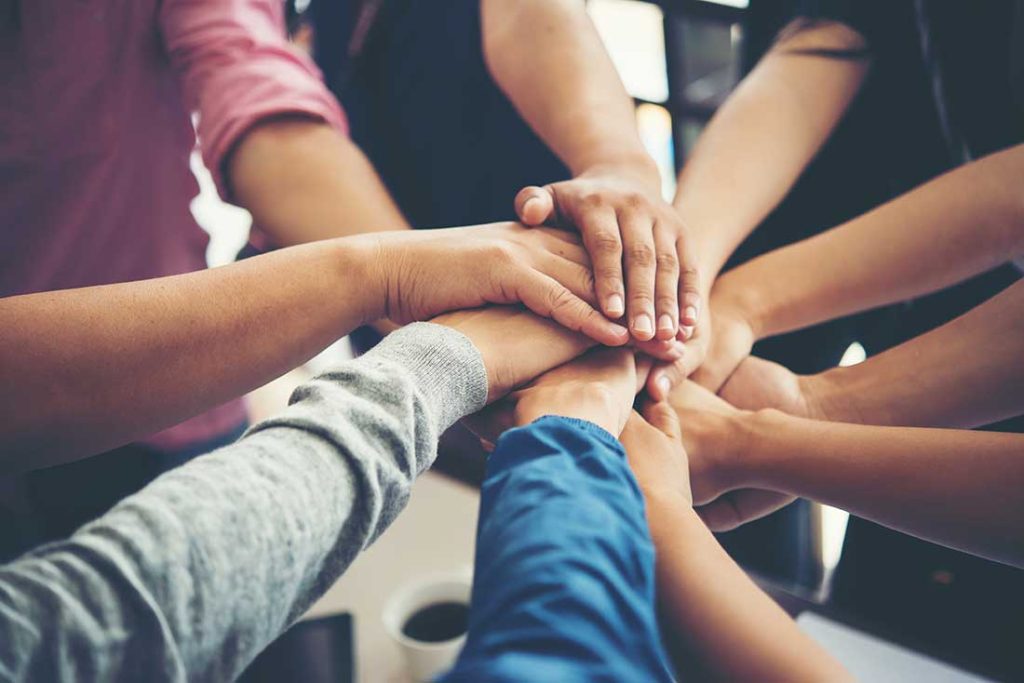
First of all, let’s formulate a definition. Teamwork is a coordinated, organized joint activity of people. They pursue common goals and share responsibility for the achieved result. But not every group of people working together can be called a team. Employees of one company sitting in the same office, even working on a joint project, are not always a team.
The term was originally used in sports to refer to a group of athletes united by a common goal, each acting in a common interest. Example: a basketball or volleyball team whose members have a common goal, act together within a developed strategy, but each has a different area of responsibility.
Nowadays this concept is actively used in the business environment. A team is commonly referred to as a small group of people (from three to twelve participants) bound by common interests, goals and commitments.
Let’s try to give a description of teamwork through the main attributes:
- Overall Objective.
- Striving for continuous improvement in productivity.
- Mutual Responsibility.
- Complementary skills.
- Small number of participants.
Team members depend on each other. Therefore, the results of each of them influence the overall success. The interests of an individual in such a team are secondary. Common tasks and achievements come first. Each member of the group knows how to competently use his knowledge, skills and experience, shares them with his comrades, cares about the welfare of others. Together they act as a whole. Such joint activity gives an effect that is many times greater than the resources and efforts spent on achieving the goal. Teamwork is always based on synergy and equality.
Distinctive characteristics of the team

Each team has its own characteristic traits:
- Common goals that unite its members. They are clear and valuable for each member of the group. As they are achieved, the group sets new goals for itself.
- Motivation is one of the most important aspects of teamwork. All team members act consciously and are interested in achieving the common goal as soon as possible. They sincerely want to successfully complete all assigned tasks and actively work for the result. Joint achievements of the team are the main value of its members.
- Long-term collaboration. The team is not assembled to do one-off work. It always has plans and goals for the future.
- Limited number of participants. A team cannot consist of one person or include a large number of people. Studies have shown that the best performance is demonstrated by teams of 3 to 10 people. Organizing and coordinating large teams requires additional funds and resources.
- Role allocation. As in sports, each team member strives to achieve common goals, acting within his own competence. All team members are assigned a separate role. Someone organizes meetings, someone communicates with clients, analyzes the information received.
- Absence of hierarchy. A team is a structured, organized collective in which there are no leaders and subordinates. All its members are equal among themselves.
- Collegial decision-making. This is done by organizing joint meetings and discussions where all participants take turns speaking so that everyone can express their ideas and suggestions.
- Autonomy. The team solves any work issues independently.
Every executive or manager knows that it is impossible to assemble a good team overnight. It has to go through certain steps along the way:
- The first stage is the adaptation of the team. People exchange information, test each other’s capabilities and abilities. This stage is characterized by low efficiency due to mutual wariness and mistrust.
- In the second phase, small interest groups are formed in the team. In this phase, disagreements are possible because of mismatched goals or motivations for teamwork.
- The third stage is cooperation. Team members realize the importance of a common task. They have a desire to solve it together. At this stage, the pronoun “we” appears for the first time in the formulations and ways of solving tasks.
- The fourth phase is associated with the development of norms, rules and principles of teamwork. Interpersonal communication moves to a qualitatively new level. A sense of trust and empathy towards colleagues emerges.
- The fifth stage of team building is functioning. At this stage, balanced and constructive solutions to problems are made. Roles are distributed among the participants. A real team appears, with common goals, each member of which contributes to their achievement, putting public interests above personal ones.
Pros and cons of teamwork
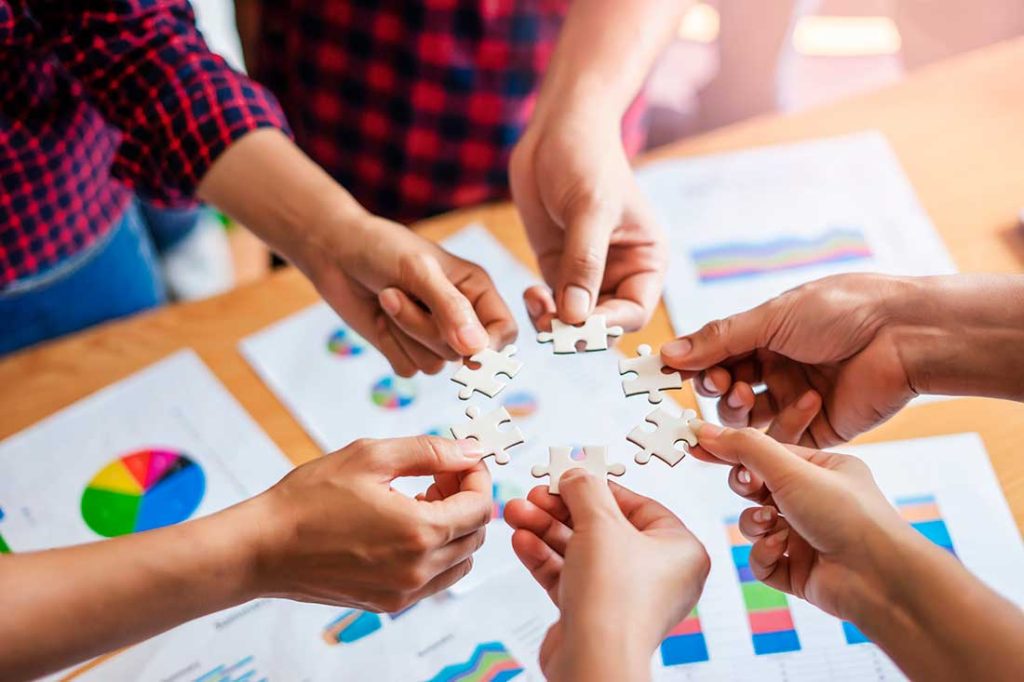
Organized teamwork and teamwork helps you find common ground with others, interact effectively with others, use your strengths wisely, and respect your colleagues. Top key benefits of teamwork:
- Solving complex tasks that one person cannot cope with. At its core, teamwork involves accelerating processes and improving quality by building a cohesive team. By joining forces, employees can show excellent results that far exceed their individual achievements.
- Positive impact on self-esteem. By contributing to the common cause, participants realize their value and usefulness to the team.
- Development of the skill of communicating with others, the ability to constructively and adequately perceive criticism, to discuss, to convey one’s point of view to others.
- Fostering a sense of respect for the labor of others, the formation of analytical thinking.
- Career development. Teamwork has a positive impact on the career of individual employees. Working in a team allows for the development of cooperation skills, improves communication and facilitates the exchange of experience among participants.
Teamwork skills are among the top ten most in-demand characteristics in 2023 according to LinkedIn. All top global companies strive to build strong, organized teams. Here are a few more reasons why teamwork is important for success:
- In the process of teamwork, innovations are born, mistakes are promptly detected and optimal ways of solving any problems are selected. Such results are achieved thanks to the psychological safety of employees. They listen to the advice of colleagues and are free to express their own opinions.
- A good team saves the company resources required to hire and train new employees. People value their jobs, want to stay where they are valued, respected, listened to and paid adequate salaries for real merit.
- Joint teamwork helps you make bold and prompt decisions. Feeling the support of colleagues makes it easier to make difficult, sometimes risky choices. But it is the big risks that often bring serious profits.
The results of team activities are always higher than when performing similar tasks alone. Joint work in a team helps to realize large-scale and complex projects.
Consider the disadvantages of teamwork:
- Any team needs extra time to get acclimated. It takes weeks, and in some cases even months, to build a cohesive team.
- The speed of teamwork is slower than individual work, especially when the number of participants is large. For example, it is not always possible to get everyone together at a specified place at a specified time.
- Discussions and arguments also take up a certain amount of work time, although they are beneficial to the work process. If you think you are right on an issue, it is not certain that you will be able to convince others.
- Decisions on any issue require majority agreement. Because of this, they may be delayed and delayed.
There are activities for which teamwork is inappropriate. For example, monotonous routine labor or individual sports.
What skills are needed to work in a team

A friendly, well-functioning and cohesive team is the dream of every manager. But it takes time and effort to get a well-functioning, efficient team at your disposal. Moreover, for successful interaction with each other, team members must possess certain characteristics and skills. They are formulated on the basis of the Big Five five-factor personality model, which describes five traits of human character: openness, conscientiousness, benevolence, extraversion and neuroticism. Skills needed in teamwork:
- Reliability. One of the most valuable qualities of any specialist is the ability to keep his promises. He is always on time for meetings and delivers work on time. To sharpen and develop this skill, it is important to learn to manage time: make plans, fix them in a notebook or app, and track the execution. A constantly late, disorganized, deadline-busting employee is a “weak link” in any team. He destabilizes the discipline in the team and slows down the work. Therefore, it is necessary to “put him in his place” or get rid of such “ballast” in good time.
- Ability to listen, restraint in conversation. It is very difficult to keep yourself in control and patiently listen to other people without interrupting. But this skill gives a lot of advantages. First, the respect and sympathy of colleagues. Secondly, valuable information that may be useful in future work. And, thirdly, you learn to control any conversation, to direct it in the right direction.
- “Keeping to yourself” bad moods and negative emotions. They should not be carried into the team. The bad mood of even one employee has a detrimental effect on the entire team. This is one of the negative factors that should be avoided when working together.
- Enthusiasm. By treating their work with sincerity and love, team members encourage each other and energize others with optimism.
How roles are assigned in the team
All team members are equal in rights, but it is important to realize that their roles are different. They hide the functionality of each performer. For example, motivators (working with organizational and material resources), implementers (executors) and pedants (controllers) are responsible for actions. Interaction within the team is organized by coordinators (leaders), resource researchers (diplomats) and team players (the soul of the team). Generators (theorists), strategic analysts (gray cardinals) and experts are in charge of generating ideas. They are the consulting arm of the team. When assigning roles, it is worth taking into account not only professional skills, but also the personality types of employees.
Team building by organizing training and various corporate events – is used to improve teamwork efficiency. Team building shows excellent results – it helps to strengthen team cohesion. Joint games and sports activities help to strengthen team spirit, and group trainings allow to develop soft skills and improve relationships within the team. Management should take the most responsible approach to the preparation of such events and take into account all the wishes of employees and the specifics of the team in order to unite the participants and build a truly successful team.
In addition to team building, there are many specialized practices that improve teamwork. For example:
- Scrum is a project management methodology based on iterative and incremental development.
- Agile methodologies are a set of methodologies based on an agile approach to project management and product development.
- Kanban is a process management method that helps to visualize processes and track all the steps of work.
Each of these methods allows the team to do the work faster and better, reduce costs and improve product quality. It is very easy to master them, you just need to know the basic principles.
Organizing teamwork with LeaderTask
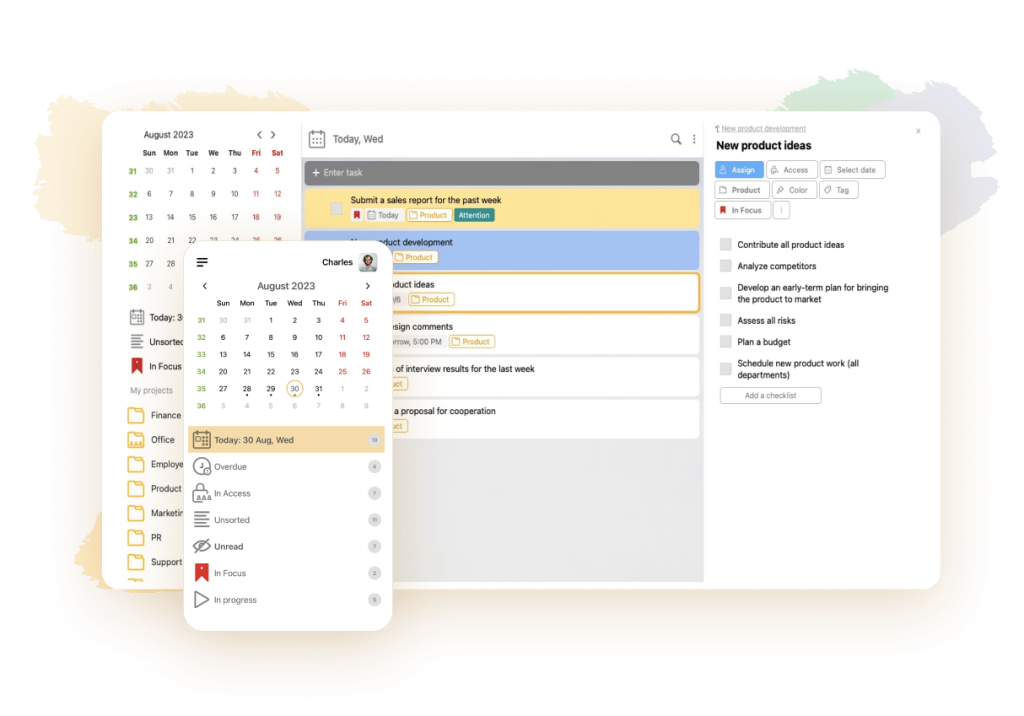
Organizing work in a team is a painstaking, time-consuming process. For this purpose, effective automated management systems are used, such as the corporate task manager LeaderTask, which allows you to increase the efficiency of your team. With its help, you can unite and organize the members of any team, even if they are geographically located in different cities or corners of the planet.
You create a company group in the service, add employees to it, assign roles and assign specific tasks to each performer or an entire team. Then you control the deadlines and progress of their fulfillment. Each task card has a built-in chat, where you can discuss any questions and project details. The manager can add priority tags (“Important”, “Urgent”), checklists, and any files to it.
You can follow the progress in the “Calendar” or “Schedule” tabs, where all tasks and tasks of an employee for the current day or week are displayed. Analyze the performance of past actions in the “Task History”. Using the special “God Mode”, the manager can see and control the tasks of all his subordinates.
The app works on all digital platforms, including without an internet connection.
Conclusion
So, what is the most important thing in teamwork? To follow the rules of the team, to treat its members with respect and attention, to strive for development, to be enthusiastic and optimistic about your work and to energize others with this energy. A manager who wants to create a good team should set realistic, achievable, clearly defined goals for his subordinates. Each performer should have his own role with specific responsibilities and tasks. The team needs a clear plan to ensure transparency of actions. It is also important to monitor the size of the team (up to 10 people is optimal) and the psychological environment in the team.
